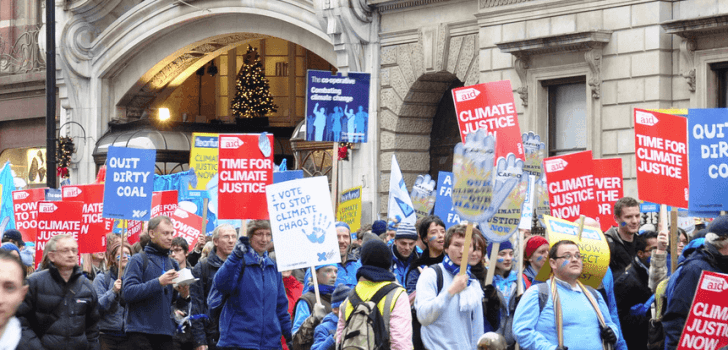As the United Nations (UN) climate talks begin in Paris, the world’s poorer countries that are most vulnerable to the effects of climate change have out maneuvered the agendas of the world’s big shots. They are challenging Europe, the U.S. and China to step up their game and set a long-term temperature increase goal of 2.7 fahrenheit rather than their 3.6 stated goal.
The 44 country strong Alliance of Small Island States (Aosis) has partnered with other vulnerable countries, demanding the 3.6 F goal be dropped because its approval would “seal the fate of hundreds of millions of people in countries like Bangladesh, the Philippines, Sudan and Vietnam.”
Aosis chairman and energy minister of the Maldives, Thoriq Ibrahim, says, “Our members are particularly vulnerable to climate extremes and climate change impacts and we are acutely aware of the vanishingly little time remaining to adopt a legally binding climate treaty. We are very concerned that the INDCs (intended nationally determined contributions) would spell disaster for many small island states and other vulnerable countries. It is therefore critical that the Paris agreement is ‘designed for ambition’ to quickly get us back on track.”
Ibrahim adds, “Aosis wants countries to “peak” their emissions urgently. A long-term temperature goal of well below 1.5 degrees (2.7 f) must be reflected in the Paris agreement, along with an indicative pathway for achieving it, including urgent peaking and deep mid-century emissions reductions.”
Aosis is made up of mainly small, low-lying states in the Caribbean, Indian Ocean, Mediterranean, Pacific, South China Sea and Africa, and includes Jamaica, Belize, Cape Verde, Singapore, Papua New Guinea and the Maldives.
Aosis’ voice at the Paris talks has been strengthened by a partnership with countries from the Climate Vulnerable Forum (CVF), which includes larger countries such as the Philippines and Bangladesh.
CVF spokesperson, Saleemul Huq, says, “We are the countries who will suffer the most from climate change and against whom all the big [negotiating] groups like the U.S., EU and G77 are aligned. We are the majority: 106 of the 195 countries of the world want this 1.5C target. But there is no democracy here. It’s a power game and the powerful are not on our side. We accept it is not realistic in these talks, but it is the right thing to do.”
The demands by the two climate vulnerable groups raised the political temperature of the Paris talks as they have strong support from global civil society groups.
Christian Aids, senior climate adviser Mohamed Adow, says, “Although today the leaders of the rich and powerful nations will make all the headlines, it is vital that the voices of the world’s most vulnerable countries are heard. These countries have grown tired of empty words from world leaders and they cannot afford any more in Paris. They are reaching out between and across traditional negotiating blocs to help build a better and safer future for all of us.”
Aids adds “We are in danger of making these communities the global ‘canaries in the coal mine’ and letting them suffer by allowing global temperatures to rise even two degrees above pre-industrial levels. For these countries, a two-degree world is a miserable one and they are right to use their high moral authority to call for bolder and more ambitious action from this summit.”
In a written statement issued today along with its demands Aosis writes, “The latest science confirms what we are seeing with our own eyes: the World Meteorological Organisation reports that 2011-2015 has been the warmest five-year period on record and that this year is on track to be the hottest ever.”
